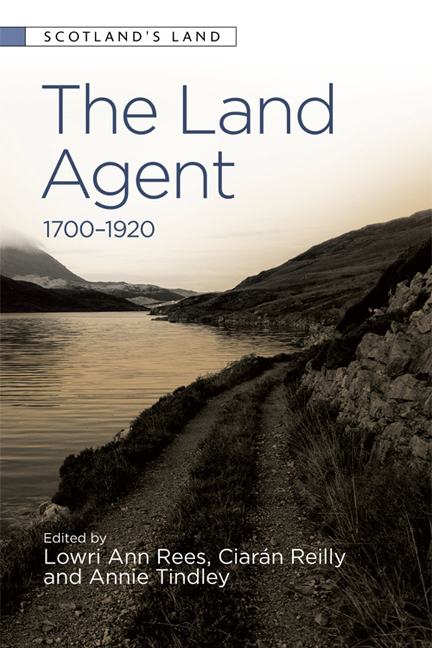Book contents
- Frontmatter
- Contents
- List of Figures
- Acknowledgements
- Notes on the Contributors
- Map of the British and Irish Isles
- Introduction
- Part I Power and its Constructions on Landed Estates
- Part II The Transnational Land Agent: Managing Land in the Four Nations and Beyond
- Part III Challenges and Catastrophe: The Land Agent under Fire
- 7 The Tenant Right Agitation of 1849–50: Crisis and Confrontation on the Londonderry Estates in County Down
- 8 Frustrations and Fears: The Impact of the Rebecca Riots on the Land Agent in Carmarthenshire, 1843
- 9 The Evolution of the Irish Land Agent: The Management of the Blundell Estate in the Eighteenth Century
- 10 ‘Between two interests’: Pennant A. Lloyd's Agency of the Penrhyn Estate, 1860–77
- Part IV Social Memory and the Land Agent
- Postscript
- Index
9 - The Evolution of the Irish Land Agent: The Management of the Blundell Estate in the Eighteenth Century
from Part III - Challenges and Catastrophe: The Land Agent under Fire
Published online by Cambridge University Press: 11 August 2018
- Frontmatter
- Contents
- List of Figures
- Acknowledgements
- Notes on the Contributors
- Map of the British and Irish Isles
- Introduction
- Part I Power and its Constructions on Landed Estates
- Part II The Transnational Land Agent: Managing Land in the Four Nations and Beyond
- Part III Challenges and Catastrophe: The Land Agent under Fire
- 7 The Tenant Right Agitation of 1849–50: Crisis and Confrontation on the Londonderry Estates in County Down
- 8 Frustrations and Fears: The Impact of the Rebecca Riots on the Land Agent in Carmarthenshire, 1843
- 9 The Evolution of the Irish Land Agent: The Management of the Blundell Estate in the Eighteenth Century
- 10 ‘Between two interests’: Pennant A. Lloyd's Agency of the Penrhyn Estate, 1860–77
- Part IV Social Memory and the Land Agent
- Postscript
- Index
Summary
INTRODUCTION
IN 1786 A SOMEWHAT despondent John Hatch requested to be relieved of his duties as agent of the Blundell estate in King's County (Offaly), insisting that the town of Edenderry was ‘dwindling into ruin’. In particular, Hatch, who had replaced his father Henry as agent, highlighted that both hardship and poverty were endemic at Edenderry and in general there was not much he could do to overturn circumstances. It was not, as we shall see below, the first, or indeed the last time that Hatch indicated his wish to be relieved of the agency duties. Faced with the unenviable task of managing an Irish landed estate in decline, Hatch was just one of five agents appointed to the Blundell estate during the eighteenth century. It was a position in which he remained until his death in 1797, at which time irregularities were found with his management of the estate. However, this was a frequent occurrence and was something which befell many eighteenth-century landed estates (and indeed later). The reason for such dilatory (and perhaps dishonest) practice was believed to have stemmed from the fact that the nature of the agents’ duties was imprecise and that the role lacked any professionalism. This chapter examines the management of the 14,000-acre Blundell estate during the period 1700–80 and in particular the career of father and son combination, Henry and John Hatch, agents between them for over fifty years. Their agency of the Blundell estate offers an insight into the evolution and the complexities of the land agency business in eighteenth-century Ireland.
In May 1705 Francis Blundell appointed Nathaniel Taylor of Edenderry as:
my true and lawful attorney for me and in my name and to my own proper use … to receive all such rents yearly or half-yearly payments … and to do and act all such things for procuring the said rents as to him shall seem met.
- Type
- Chapter
- Information
- The Land Agent , pp. 168 - 183Publisher: Edinburgh University PressPrint publication year: 2018



